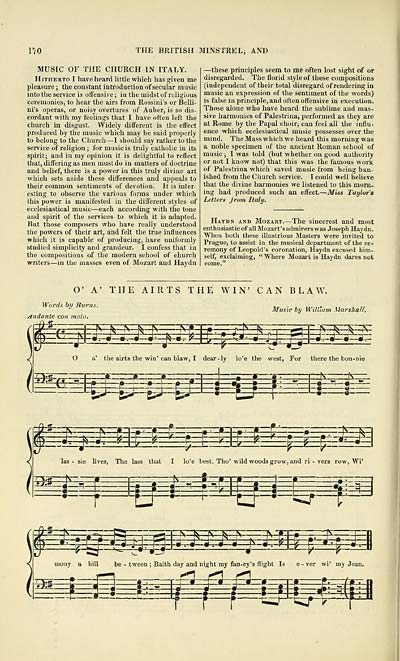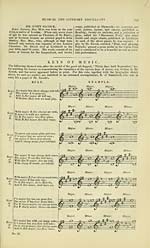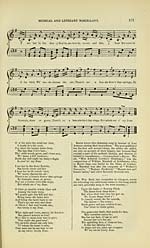Glen Collection of printed music > Printed music > British minstrel, and musical and literary miscellany
(178) Page 170 - O' a' the airts the win' can blaw
Download files
Complete book:
Individual page:
Thumbnail gallery: Grid view | List view

170
THE BRITISH MINSTREL; AND
MUSIC OF THE CHURCH IN ITALY.
Hitherto I have heard little which has given me
pleasure; the constant introduction of secular music
into the service is oflensive ; in the midst of religious
ceremonies, to hear the airs from Rossini's or Belli-
ni's operas, or noisy overtures of Auber, is so dis-
cordant with my feelings that I have often left the
church in disgust. Widely different is the effect
produced by the music which may be said properly
to belong to the Church — I should say rather to the
service of religion ; for music is truly catholic in its
spirit; and in my opinion it is delightful to reflect
that, differing as men must do in matters of doctrine
and belief, there is a power in this truly divine art
which sets aside these differences and appeals to
their common sentiments of devotion. It is inter-
csting to observe the various forms under which
this power is manifested in the different styles of
ecclesiastical music — each according with the tone
and spirit of the services to which it is adapted.
But those composers who have really understood
the powers of their art, and felt the true influences
which it is capable of producing, have uniformly
studied simplicity and grandeur. I confess that in
the compositions of the modern school of church
writers — in the masses even of Mozart and Haydn
— these principles seem to me often lost sight of or
disregarded. The florid style of these compositions
(independent of their total disregard of rendering in
music an expression of the sentiment of the words)
is false in principle, and often offensive in execution.
Those alone who have heard the sublime and mas-
sive harmonies of Palestrina, performed as they are
at Rome by the Papal choir, can feel all the influ-
ence which ecclesiastical music possesses over the
mind. The Mass which we heard this morning was
a noble specimen of the ancient Roman school of
music; I was told (but whether on good authority
or not I know not) that this was the famous work
of Palestrina which saved music from being ban-
ished from the Church service. I could well believe
that the divine harmonies we listened to this morn-
ing had produced such an effect. — Miss Taylor's
Letters Jrrnn Italy,
Haydn and Mozart. — The sincerest and most
enthusiastic of all Mozart'sadmirerswas Joseph Haydn.
When both these illustrious Masters were invited to
Prague, to assist in the musical department of the ce-
remony of Leopold's coronation, Haydn excused him-
self, exclaiming, " Where Mozart is Haydn dares not
O' A' THE AIRTS THE WIN' CAN B L A W.
Words bif Burns.
Andante con tnoto*
Music by William Marshal/.
N 1^ - fs , 1 ^ " N . -j V^-
■rf f^ — r* h^ 1* K^ f^-F-
^
:^
■'E^5:~5
1^
3^S?-i
¥^-J-i-
O a' the airts the win' can blaw, I dear-ly lo'e the west, For there the bon-nie
SB
^^^i^^
:is=^t
S^-
^^=|3=#aE4!^
1\ ^ ^ -
K=^
:^i==F^S==^
zr.
lESEE^E?
±z
' ^,1-
-/-
as
las- sie lives, The lass that I lo'e best. Tho' wild woods grow, and ri - vers row, "Wi'
^
JQE
\ — s —
B
-■=1 — »-=v
1
izl:
.^^,
li^-
fcis:
:=i=k:
N ~ r ~ N~K :
^m
i
^
=i=p.
^r^^zf^-t±ixg=i;
;3-i±S=:i
Ifc
iPt=iT
r
ai
mony a Iiill
1»
m
be - tween ; Baith day and night my fan-cy's flight Is e - ver wi' my Jean,
^
R^F^
-.ie^=m
■t;3*~tr-
THE BRITISH MINSTREL; AND
MUSIC OF THE CHURCH IN ITALY.
Hitherto I have heard little which has given me
pleasure; the constant introduction of secular music
into the service is oflensive ; in the midst of religious
ceremonies, to hear the airs from Rossini's or Belli-
ni's operas, or noisy overtures of Auber, is so dis-
cordant with my feelings that I have often left the
church in disgust. Widely different is the effect
produced by the music which may be said properly
to belong to the Church — I should say rather to the
service of religion ; for music is truly catholic in its
spirit; and in my opinion it is delightful to reflect
that, differing as men must do in matters of doctrine
and belief, there is a power in this truly divine art
which sets aside these differences and appeals to
their common sentiments of devotion. It is inter-
csting to observe the various forms under which
this power is manifested in the different styles of
ecclesiastical music — each according with the tone
and spirit of the services to which it is adapted.
But those composers who have really understood
the powers of their art, and felt the true influences
which it is capable of producing, have uniformly
studied simplicity and grandeur. I confess that in
the compositions of the modern school of church
writers — in the masses even of Mozart and Haydn
— these principles seem to me often lost sight of or
disregarded. The florid style of these compositions
(independent of their total disregard of rendering in
music an expression of the sentiment of the words)
is false in principle, and often offensive in execution.
Those alone who have heard the sublime and mas-
sive harmonies of Palestrina, performed as they are
at Rome by the Papal choir, can feel all the influ-
ence which ecclesiastical music possesses over the
mind. The Mass which we heard this morning was
a noble specimen of the ancient Roman school of
music; I was told (but whether on good authority
or not I know not) that this was the famous work
of Palestrina which saved music from being ban-
ished from the Church service. I could well believe
that the divine harmonies we listened to this morn-
ing had produced such an effect. — Miss Taylor's
Letters Jrrnn Italy,
Haydn and Mozart. — The sincerest and most
enthusiastic of all Mozart'sadmirerswas Joseph Haydn.
When both these illustrious Masters were invited to
Prague, to assist in the musical department of the ce-
remony of Leopold's coronation, Haydn excused him-
self, exclaiming, " Where Mozart is Haydn dares not
O' A' THE AIRTS THE WIN' CAN B L A W.
Words bif Burns.
Andante con tnoto*
Music by William Marshal/.
N 1^ - fs , 1 ^ " N . -j V^-
■rf f^ — r* h^ 1* K^ f^-F-
^
:^
■'E^5:~5
1^
3^S?-i
¥^-J-i-
O a' the airts the win' can blaw, I dear-ly lo'e the west, For there the bon-nie
SB
^^^i^^
:is=^t
S^-
^^=|3=#aE4!^
1\ ^ ^ -
K=^
:^i==F^S==^
zr.
lESEE^E?
±z
' ^,1-
-/-
as
las- sie lives, The lass that I lo'e best. Tho' wild woods grow, and ri - vers row, "Wi'
^
JQE
\ — s —
B
-■=1 — »-=v
1
izl:
.^^,
li^-
fcis:
:=i=k:
N ~ r ~ N~K :
^m
i
^
=i=p.
^r^^zf^-t±ixg=i;
;3-i±S=:i
Ifc
iPt=iT
r
ai
mony a Iiill
1»
m
be - tween ; Baith day and night my fan-cy's flight Is e - ver wi' my Jean,
^
R^F^
-.ie^=m
■t;3*~tr-
Set display mode to: Large image | Transcription
Images and transcriptions on this page, including medium image downloads, may be used under the Creative Commons Attribution 4.0 International Licence unless otherwise stated. ![]()
| Special collections of printed music > Glen Collection of printed music > Printed music > British minstrel, and musical and literary miscellany > (178) Page 170 - O' a' the airts the win' can blaw |
|---|
| Permanent URL | https://digital.nls.uk/91437081 |
|---|
| Description | Scottish songs and music of the 18th and early 19th centuries, including music for the Highland bagpipe. These are selected items from the collection of John Glen (1833 to 1904). Also includes a few manuscripts, some treatises, and other books on the subject. |
|---|
| Description | The Glen Collection and the Inglis Collection represent mainly 18th and 19th century Scottish music, including Scottish songs. The collections of Berlioz and Verdi collected by bibliographer Cecil Hopkinson contain contemporary and later editions of the works of the two composers Berlioz and Verdi. |
|---|

